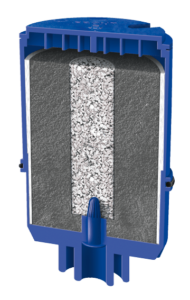The Difference Between Water Softeners, Water Filtration Systems and Descalers
Selecting the Water Treatment System that is Right for You
Living in Houston, you’ve probably noticed a distinct smell in your water or a buildup of limescale on your sinks and appliances. And you probably have attempted to scrub away water ring stains in your toilet with little success. On the other hand, you may be ahead of the game and already have some type of water treatment system for your home. But often times, homeowners aren’t sure if they need a water softener system, a water filtration system, or a descaling system to fix their problem.
If you’re hearing the buzz about “saltless water softeners”, it’s important for you to understand that these are not a true water softener systems. Salt-free softeners are actually water conditioner systems that do not soften your water.
How Do Water Filtration Systems Work?

Which Water Filtration System is the Best?
Not all filters reduce all contaminants, so by working with an expert plumber, you’ll be able to determine what types of filters best address your water issues. Some filter specific contaminants better than others.
There are a wide range of water filters for you to consider:
- Carbon Blocks and Granulated Activated Carbon: Carbon filters can remove chlorine, taste, odors, lead, mercury and VOCs (volatile organic compounds) depending on the type of filter you select. Carbon blocks can filter out finer contaminants but can greatly impact the water pressure in your home; small pores become clogged with the filtered debris over time requiring the filter to be changed more frequently. Granulated activated carbon filters are generally the best option for whole house filtration systems because they do not not impact your water pressure and generally last the longest, sometimes years.
- Ceramic: Removes solid contaminants such as cysts and sediments, but they do not remove chemical contaminants.
- Deionization: Deionization removes mineral salts and other electrically charged molecules (ions) from water. Cannot remove non-ionic contaminants (including trihalomethanes and other common volatile organic compounds) or microorganisms.
- Distillation: Removes minerals, many bacteria and viruses and chemicals that have a higher boiling point than water. Cannot remove chlorine, trihalomethanes or volatile organic chemicals (VOCs).
- Mechanical Filters: Removes contaminants such as asbestos, giardia cysts, loose scale, dirt and other sediments. Cannot remove chemical contaminants.
- Ozone: Removes bacteria and other microorganisms and is often used in conjunction with other filtering technologies. Removes iron, manganese, taste, odors, sulfur without adding chemicals.
- Reverse Osmosis: Removes many contaminants not removed by activated carbon, including arsenic, fluoride, hexavalent chromium, nitrates and perchlorate. Cannot remove chlorine, trihalomethanes or volatile organic chemicals (VOCs). Many reverse osmosis systems include an activated carbon component than can remove these other contaminants.
- UV (ultraviolet): Kills bacteria and other microorganisms but cannot remove chemical contaminants.
You can actually have your water tested by an expert plumber and know the exact contaminants that need to be filtered out before you decide on a particular water treatment system.
Water Filters for Drinking Water:
If your only concern is the water you drink from the tap, you may opt for a point-of-use (POU) system. If you have a lot of lead, copper, fluoride, or nitrate in your water, reverse osmosis systems are the only systems certified by the National Sanitation Foundation (NSF) to treat those contaminants.
Water Filters for All the Water in Your Home:
If you want cleaner, neutral-smelling water for general usage like drinking, bathing, cooking, washing laundry (and the dog), a POU system isn’t practical for producing the average 400 gallons of water we use a day. For this type of need, a heavy duty whole-house water filtration system is the best solution overall, because it provides an unlimited supply of pure, filtered water for a unit lifespan of more than ten years. This means every drop of water that comes into your home is optimally treated. As one homeowner put it, “It’s like showering in bottled water!”
How Does a Water Softener System Work?

Water softeners use a salt solution and ion-exchange resins to fight calcium and magnesium hardness to make everything work better, including your pipes. Calcium and magnesium ions found in hard water adhere to the resin beads in the mineral tank. The brine tanks then sends a salt solution through the mineral tank to flush out the dirt and minerals from your water. Excess brine is flushed from the mineral tank in the final processing phase. If you’re worried about the amount of salt added to your potable water, you’ll be happy to know it is less than the sodium in a slice of bread.
Which Water Softener to Buy?
The best water softener for your home is one that is NSF-certified, meets all plumbing codes, and manufactured locally in the US for quality assurance purposes. Water softener systems, like Fusion XT Series, meets all these criteria and offers many other advantages including an industry leading chlorine-resistant resin, full flow control valves that promote high flow rate applications, and a limited lifetime manufacturer warranty. The system is even offered in different sizes to suit the size of your home.
When you shop around, make sure you consult with expert plumber who knows about water softeners, or else you might wind up with a system that ultimately restricts the flow of the water entering your home. Home services giants, like Lowe’s and Home Depot, may carry more inexpensive cabinet-style units where the resin tank is built into the brine tank, but be warned that these units have a short life expectancy and can seriously impact the flow of your water. The most important things to consider is the maximum flow rate, the life expectancy of the softener, the maintenance requirements, and the experience of the plumber who is installing it. Make sure you read through all the marketing and make an educated decision based on the needs of your home, family and obviously your budget. By seeking the help of an experienced plumbing company, you can get a clear understanding of which water softener systems will and won’t work according to your water quality and your needs.
If you’re hearing the buzz about “saltless water softeners”, it’s important for you to understand that these are not a true water softener systems. Salt-free softeners are actually descaling systems that do not soften your water. These systems provide some of the benefits of a softener, but they do not offer the whole home solution.
What is a Water Conditioner System?
If you are not looking for a soft water feel and would like a maintenance-free option to deal with your hard water, a water conditioner may be for you. Water conditioners are able to neutralize hard water scaling properties while providing a wide range of benefits including low-to-no maintenance, no salt use, less space usage, energy efficiency, removal of existing scale build-up, longer warranties and no drain or wasted water.
The most advanced water conditioner today, Flow-Tech Home has cutting edge technology is far more effective than any other water conditioner system on the market. Not only will the Flow-Tech system eliminate limescale from occurring in your home, it will also remove existing build-up, increasing flow and efficiency. Once installed, the unit does not require any maintenance. It is important to note that water conditioners do not provide the soft water feel since the minerals remain in the water. The minerals are simply rendered harmless and will no longer build up.
A water conditioner will help you save money as it helps maintain and increase the efficiency of your plumbing system – the water heater, all water-using appliances, fixtures and faucets.
I Still Can’t Decide Which Water System to Buy…
Given the quality of water in Houston, it’s fairly common for homeowners to have both a water softener and filtration system. But it’s best to consult with a plumbing expert who can listen to what your needs are to determine which water treatment solutions make the most sense for you, your family, and your home.
“Water softeners are great for protecting your investment; they will literally preserve and maintain your pipes from the inside out. And with a water filter in tow, your water will be pure, healthy, and taste great!” – Director of Field Operations Joe Bany
